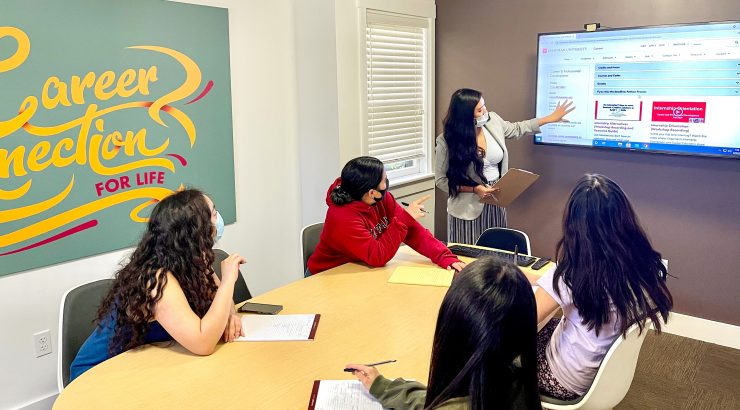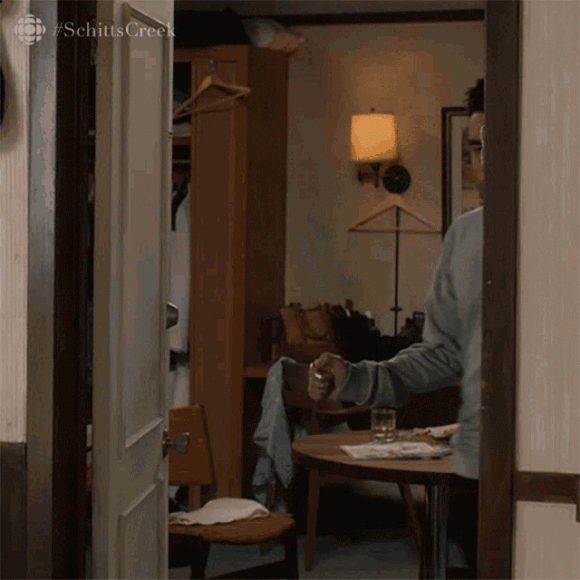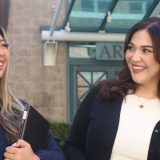
Myth vs. Fact: Internships Debunking common beliefs students may have heard about internships during college!
October 15, 2021
The holidays are coming, the holidays are coming! Which, for many of us, means struggling to artfully avoid conversations about your career and future plans with relatives.


While the holidays may still seem far away, they can sneak up on us faster than we can anticipate! Especially when our heads are constantly spinning from classes, balancing on- and off-campus involvement, finding clean and working toilets (yikes, BK first floor), remembering not to wear gray in Orange’s 90+ degree weather, and struggling to snag a parking spot.

To equip you for those long family dinners, here are some myths and facts on internships:
MYTH: I need to get an internship my first year in college
It is not expected, but possible if you are interested. We typically see students begin to pursue internships their sophomore year. We feel that the students’ first year should be focused on transitioning to college. Students following the traditional 4-year path have three years to focus on internships, but if they happen to pursue one their first year, more power to them!
FACT: Internships can turn into a full-time job offer
There are many students who start an internship that lands them a full-time job offer for when they graduate. In fact, about 70% of internships turn into full-time jobs.
This is because of a few reasons, but the main one is that the internship acts as a “trial run” for both the student and employer, and if they both provide value to one another, why not hire them full-time?
Many companies are starting to do this amid the pandemic as well, so they don’t have to go through the hiring process all over again.
MYTH: I shouldn’t work an unpaid internship

Unpaid internships are just as relevant as any other paid experience. While yes, being paid would be nice, the opportunity to gain practical work experience, an increased understanding of and exposure to a given career field, opportunities to transform classroom knowledge into “real-world” application, and the other professional development opportunities we get can be very beneficial. You never know what that opportunity can turn into! Who knows? Maybe you’ll end up with a full-time job offer from doing an unpaid internship, unlike your peer, who didn’t receive one despite doing a paid internship. Many students undermine their experiences; however, remember: internships (paid and unpaid), research, volunteer work, class projects, and other professional experiences are equally as relevant to put on your resume as jobs are.
If your internship is unpaid (or paid), we encourage you to register your internship for academic credit to help yourself get ahead with your graduation progress.
FACT: Internships offer great opportunities for real-world experience and open new doors for you!

Opportunities can come knocking in a variety of ways! One of those ways is by taking on an internship. We have seen many students receive full-time job offers at the completion of their internship and go on to do amazing things the Chapman community is known for!
Not only can an internship further develop interpersonal and technical skills and provide you a wide network of professionals, but it can open doors for you after graduation. Even if you complete your internship well before you intend to graduate, maintain those relationships you create because you never know what might open up in the future!
We have seen students develop close relationships with people from their internships that lead to meaningful mentorships and long-lasting friendships. Those types of connections are invaluable and can take you further than just randomly connecting with people on LinkedIn and never talking to them again.
Take advantage of your position as a curious, open-minded student and soak up the advice and mentorship professionals are eager to give!

MYTH: I have to choose between working an internship and being a full-time student

Time management is key. It is definitely possible to do both. Here are some helpful tips to help you manage your time as a full-time student working an internship:
- Find a routine: Are your classes at the same time each week? Find time in between your weekly scheduled classes to dedicate time to your internship and keep in the same every week. This way, it will become routine and then you can complete any other tasks, like homework, during any free time you have outside of this.
- Write down your weekly to-dos and prioritize them by day: See what you have due for that week and maybe add any additional tasks you would like to complete if you find time throughout the week and then each day write down which tasks from that original list you would like to complete based on what is due first.
- Make sure to have some time every week for social events and to relax: It is extremely important to make sure you are leaving enough time for yourself. This will look different for everyone. For some, being around their friends is how they relax, and for others, it might be reading a book in the bath for 2+ hours on a Friday night. Either way, make sure you are giving yourself enough time to clear your mind and refresh.
- Use your time wisely: If you have nothing else to do and don’t have an assignment due for another week, get started on that assignment early, so when you work on your internship later that week you aren’t worried about completing the assignment! As for academic internships, students have the opportunity to split their credits/hours throughout their time at Chapman. For example, your class schedule does not permit you to commit to 3 credits/120 hours a semester? No problem! Split the credits accordingly per semester if you continue your internship or pursue an entirely new one.
See how other Panthers manage their time throughout the semester while working by reading Semester Schedules of Working Panthers!
FACT: I can get college credits for an internship I complete
Hands-on experience and college credit?
It is possible and a great way to get ahead in credits. You can register both paid, and unpaid internships for credit on Chapman’s Internships Portal.
For a step-by-step guide, check out our Internship Registration Checklist blog!
MYTH: I can only complete one internship while in college
Did you know that an overwhelming majority (80%) of Chapman students have at least one internship and about half complete 2 or more internships? If you are interested in registering an internship for academic credit, you have a maximum of 12 credits of internship courses that may count towards your baccalaureate degree.
Within those 12 credits, you can only intern at the same site for a maximum of 6 credits. Not only can you gain practical work experience, but take advantage of the opportunity to fulfill your major, minor, or general education requirements with an internship course! I know… awesome, right?

For reference, the amount of credits you complete at an internship comes from how many total hours you work there throughout the term. For example, you must work 120 hours throughout the semester to be able to get the full 3 credits that would otherwise be fulfilled by a course.
| Credits | Hours |
| 0.5 | 20 |
| 1 | 40 |
| 1.5 | 60 |
| 2 | 80 |
| 2.5 | 100 |
| 3 | 120 |
FACT: I can get college credits for my paid internship
A misconception students have when it comes to getting credits for their internship is that it must be unpaid. While it is true that you can get credits for an unpaid internship, it is also true that you can get credit for paid internships!

MYTH: Only students in programs that require internships to graduate can get credit for an internship
Any student, undergraduate or graduate, can receive credit for internships.
FACT: Completing an internship will help advance your overall professionalism and work ethic
In a study done by NACE, four-fifths of the students said that their internship helped them improve their professionalism and work ethic tremendously. They believe that it positively affected their overall career competencies, especially among First-Generation students.
